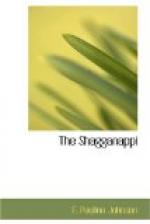“Go back, you!” cried the boy. “Two bad men’s up trail. They shoot you. They get gold.”
“Gee whiz!” yelled Big Bill, bringing his six-in-hand to a standstill. “Holdup, eh? I declare, but that’s a narrow escape. I guess Big Bill won’t cross the divide to-night.”
“No, you go back,” reiterated the boy.
“Well, I’ll be blowed if it isn’t just a kid!” exclaimed the driver, as Leloo rode up close beside him. “And look at the horse of him, clean played out. I say, boy, no wonder you rode hard, with all that gunning behind you. I’m rather handy with a gun myself, and I never drive the ‘gold’ stage without these two here,” tapping the revolvers in his big belt, “but if our friends up there had got the drop on me first, there’d have been a dead driver, and no gold for the boys in the bank, I’m thinking. What is your name, anyway, boy?”
“Me? I’m Leloo,” the little Indian replied. “My father, he Chief Buckskin, Lillooet tribe.”
“Whew!” gasped Big Bill. “Old Buckskin’s son, eh? Then you’re all right, for Buckskin is ’white’—all but his skin. You climb up beside me here, and give that poor, busted horse of yours a rest. This outfit is a-goin’ to turn back, and we’ll all sleep at Pete’s place to-night. But how did you get past those sneaking gunners up there? That’s what I want to know.”
And later when Leloo, safely seated beside the big driver, related how he had tricked the scoundrels, Big Bill was as proud as if he had been the boy’s father. “The whole Cariboo trail from end to end shall know of this,” he declared, “know just how you saved me and the miners’ gold.”
“Me no save,” said Leloo, shaking his head with denial. “Not me save, just save by big wolf-brother. He teach me to make his cry, he answer me when I talk his talk to him.”
And it must have been this speech that the big driver told far and wide, for at the next great “potlatch” (feast) given by the Lillooets, the entire tribe conferred the great honor of a new name upon Leloo, the name he had won for himself—“Wolf-Brother.”
We-hro’s Sacrifice
A Story of a Boy and a Dog
We-hro was a small Onondaga Indian boy, a good-looking, black-eyed little chap with as pagan a heart as ever beat under a copper-colored skin. His father and grandfathers were pagans. His ancestors for a thousand years back, and yet a thousand years back of that, had been pagans, and We-hro, with the pride of his religion and his race, would not have turned from the faith of his fathers for all the world. But the world, as he knew it, consisted entirely of the Great Indian Reserve, that lay on the banks of the beautiful Grand River, sixty miles west of he great Canadian city of Toronto.
Now, the boys that read this tale must not confuse a pagan with a heathen. The heathen nations that worship idols are terribly pitied and despised by the pagan Indians, who are worshippers of “The Great Spirit,” a kind and loving God, who, they say, will reward them by giving them happy hunting grounds to live in after they die; that is, if they live good, honest, upright lives in this world.




